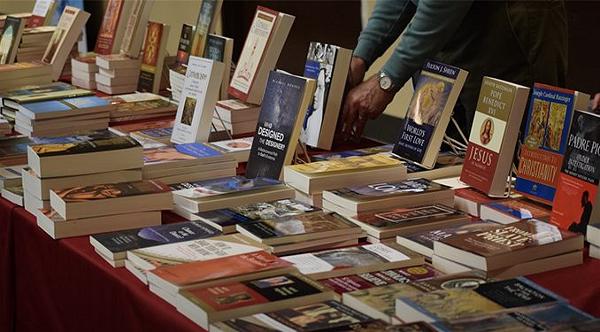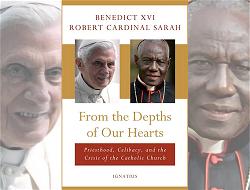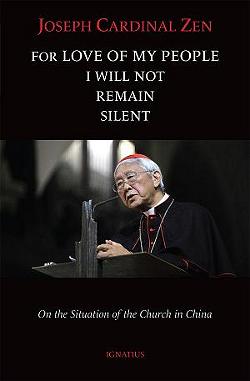In a celebration in St. Mary’s Cathedral in San Francisco this past November, the founders, staff, and several authors recalled the many books and initiatives that have poured forth from that dynamic and innovative source of insight and wisdom known as Ignatius Press. Since its founding in 1978, the Press has published some 39 million books. Today it is also into movies, home and online schooling, periodicals, liturgical music, novels, and a number of web sites, including Catholic World Report. A table of Ignatius Press books at the 40th anniversary celebration held in San Francisco the weekend of November 2-3, 2018. (Photo: Joey Zarate)
A table of Ignatius Press books at the 40th anniversary celebration held in San Francisco the weekend of November 2-3, 2018. (Photo: Joey Zarate)
The founder and director of the Press, Father Joseph Fessio, S.J., is a man of vision, good sense, and intellectual insight. Fr. Fessio is a man of many, many parts. Rumor has it that he was a hippie of sorts in his college days at Santa Clara. He studied under Joseph Ratzinger in Germany; he knew Henri de Lubac, S.J., in France. In recent decades, he also doubles as a gentleman farmer, following a way of life not unlike that described by Cicero in his famous essay “On Old Age.” Thus, he grows grapes, makes his own wine, plants vegetables, and is known to have shot a wild critter or two up in Sonoma County. Along the way, he founded the St. Ignatius Institute, sponsored a seminary in Rome, an orphanage in Mexico, and even worked some housing experiments for the poor. Against many odds, he has managed to fashion a first-class press that publishes a wide range of books on all things Catholic—intelligently Catholic. He has even designed and directed the construction of a new Ignatius Press distribution center in Illinois.
If I asked myself what has been the most influential single source of Catholic intelligence in the last forty years in this country, several candidates come to mind. We could name Thomas Aquinas College, the Focus Movement, the Cardinal Newman Society, the male and female Dominicans, the Philosophy Department at the Catholic University of America, First Things, Archbishop Charles Chaput, the Opus Dei enterprises, George Weigel, EWTN, Robert Spitzer’s Magis Institute, or Robert Royal’s Faith and Reason Institute. The larger universities are a mixed bag. To most people, they sound mostly like the secular institutions they imitate. One cannot but notice the dynamism of several smaller schools including the University of Dallas, Franciscan University at Steubenville, Christendom, Assumption, University of Mary, St. Thomas Aquinas, Benedictine College, and Thomas More.
In this context, I would have to say that the Ignatius Press stands at the top of the list. It has published or republished the works of John Paul II, Joseph Pieper, Chesterton, von Balthasar, Peter Kreeft, Scott Hahn, Joseph Pearce, and any number of other well-known authors. It republished Gilson’s Unity of Philosophical Experience, a work not to be missed. The publication of several of Ratzinger’s books made Ignatius Press known world-wide. It took courage to publish Robert Reilly’s Making Gay Okay. The Father Elijah novels of Michael O’Brien became very popular. Ignatius Press even published several Schall books, surely acts of entrepreneurial fortitude in the publishing world.
Ignatius Press books are invariably well-presented, of a similar size and texture. They are physically good to hold. Their print is easy to read. The editing is always careful. The reader can be sure that there is an argument to be made, a point to be considered that gets to the heart of some basic issue. I recall Father Fessio saying to me years ago that we never know who will read a book. A book is thrown out there into the world, searching, as it were, for a reader. We never know who, if anyone, will ever read it or when or where, or in what language. Book publishing is both an act of faith and a throwing of the dice.
A book is both a physical object and a record of a mind. As a physical object it can land anywhere. A reader may come upon it when it was first published or years or decades after. Many of Ignatius Press’ books are translations of books from other languages that would never be available to us without their being rendered into English. These translations have greatly enriched the fund of knowledge available to us. If I were to name one book that illuminates more things than any other one, I would think that it was Ignatius Press’s translation of Joseph Pieper—An Anthology.
Ignatius Press began in space provided by the Carmelite sisters in San Francisco. Several years ago, it bought a renovated firehouse on Tenth Avenue in San Francisco where it is now happily located. The staff has a somewhat monastic routine. They recite the Angelus and often have Mass. A visitor is conscious that this is no ordinary place.
Ignatius Press, for all its accomplishments, has kept a low profile. This low-keyed approach has given it a certain freedom to publish what it thinks fit. It does publish controversial works. It has a wide variety of Bibles and Bible study books, enough to make the most diligent Protestant envious. It publishes major papal encyclicals and studies on the history of the Church. Since being founded in 1978, Ignatius Press has published over 2,000 titles by several hundred different authors.
In the end, I think that Ignatius Press has accomplished for the Church in this country what Sheed & Ward did for the English-speaking world in the last century; namely, it provided a steady voice of reason that has been at the same time literate, bemused, and philosophically sound. Ignatius Press is counter-cultural. It is a reminder to everyone, Catholics included, that the first defense of the faith is in the order of mind. Ignatius Press has understood where we must stand if we believe that reason and revelation belong together.











